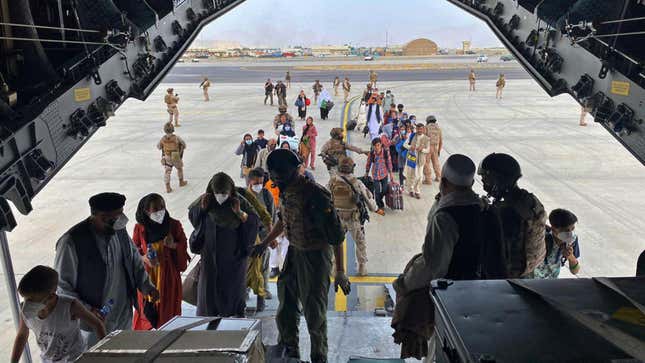
Amid the catastrophe that’s been the U.S. withdrawal from Afghanistan this week, U.S. agencies have initiated sweeping purges of online information concerning friendly Afghan nationals. Fears have arisen that the country’s ruling Taliban could seek retaliation against individuals with even the slightest associations to the Americans and the shattered Afghan security forces.
The Associated Press reported Tuesday that the U.S. departments of State and Agriculture, among others, were engaged in efforts to scrub websites and social media accounts of content that may be viewed as evidence of collaboration by the Taliban, whose unchallenged forces entered the capital city of Kabul on Sunday and swiftly assumed control.
One now-deleted article, for instance, reviewed by journalists at the AP, included photos of a town hall between U.S. agricultural officials and local Afghan leaders and farmers. On a page that now reads “Access Denied,” the article once noted that the attendees had “risk[ed] their safety” simply by attending the meeting.
The arrival of the Taliban—which first wrested control of Kabul from the Rabbani government during the Afghan Civil War, only to be expelled by U.S. forces within months of the September 11 attacks—set thousands of Afghans off on a deadly rush to the city’s Hamid Karzai International Airport on Monday, hoping to escape on out-bound planes.
The de facto surrender of U.S. forces after the nation’s longest war has left many Afghans in fear of potential violence to follow. Reports had surfaced by Tuesday of armed men searching homes—though their affiliations in some cases had not been confirmed—and of Afghan security personnel shedding their uniforms and other accoutrements in attempts to blend in with the fleeing populous.
Some advertisements depicting women without headscarves had been torn down in the capital, the New York Times reported, by residents fearful of offending the insurgents who bear strict fundamentalist views of Islamic law—not dissimilar to that of Saudi Arabia. In the past decade, several thousand women have been enrolled in schools in Afghanistan, a feat unheard of under the prior Taliban regime.
The U.S. withdrawal and the lightning-quick conquest of the capital city by the Taliban have instigated a humanitarian crisis widely likened to the Fall of Saigon, with the Biden administration now bearing much of the blame over its failure to devise an evacuation strategy accounting for the safety of America’s in-country allies.
The president’s political foes have seized on the chaos to cast contradictory barbs over his judgement: denouncing his failure to protect Afghan refugees while at the same time fearmongering over any plans to grant them safe harbor on U.S. soil.